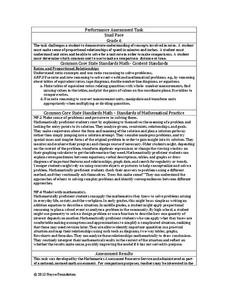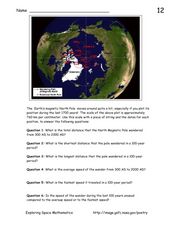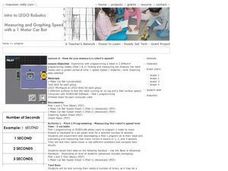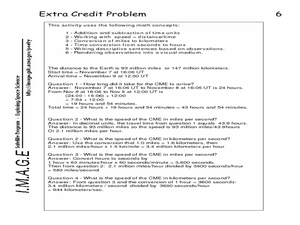Curated OER
Glacier Dynamics
Students create flubber glaciers. In this glacier dynamics lesson, students experiment factors that may affect glacier speed. Factors include slope, ice temperature, and basal conditions. Students develop hypothesis, conduct experiment,...
Curated OER
Hang Time
Students simulate the motion of a fly ball with different winds. They use a partner to provide the simulated wind. Students draw a baseball diamond and the field on a piece of paper. They drag the pen across the paper to show the path of...
Cornell University
Physics of Flight
Up, up, and away! Take your classes on a physics adventure. Learners explore the concepts important for flight. They experiment with the Bernoulli Principle while learning the forces that act on airplanes in flight.
Noyce Foundation
Snail Pace
Slow and steady wins the race? In the assessment task, scholars calculate the rates at which different snails travel in order to find the fastest snail. Hopefully, your class will move much more quickly in finishing the task!
NASA
Egg Drop Lander
You have to crack a few eggs to make a good engineer! Working in small groups, young scholars design, build, and test devices that protect an egg from breaking when dropped from a ladder.
Curated OER
Earth's Magnetic Pole
In this Earth's magnetic pole worksheet, students use a diagram showing the changes in the magnetic pole of the Earth over time. Students use the given scale of the changes to answer 6 questions about the average speed of the magnetic...
Curated OER
Rates of Change
In this rate of change worksheet, students read about how to calculate the rate of change in different processes such as plant growth. They are given example problems and practice calculating rates of change.
Curated OER
Aurora to Magnetosphere Global Exploration
In this magnetosphere global exploration activity, students read about the instrument on board a satellite launched by NASA called the Radio Plasma Imager. This imager detects echoes from plasma clouds. Students calculate the distance to...
National Council of Teachers of Mathematics
Varying Motion
For this secondary mathematics learning exercise, high schoolers collect data based on a person’s motion. From this data, learners create graphs comparing displacement, velocity, and acceleration to time. The five-page learning exercise...
Curated OER
The Martian Dust Devils
In this martian dust devils activity, students use images of a dust devil captured by NASA's Spirit rover to calculate the distance the dust devil traveled, the speed, and its acceleration or deceleration.
Curated OER
Introduction to Lego Robotics
Learners utilize computer programs to operate a simple robot. In this technology activity, students create robots using Lego pieces and simple motors to move them. Learners measure the speed of the robots by running Robolab...
Curated OER
Automobile-Accident Reconstruction
Students investigate an accident and relate it to math. In this trigonometry lesson, students measure the accident scene, the friction produced, and the speed from the skid marks. They create a poster of their findings.
Curated OER
Arc Length Lesson
Students find the length of the arc of a circle. In this geometry lesson, students calculate the length of an arc and find the measure of the central angle given the length of the arc. They convert between linear and angular speed. They...
Curated OER
Math in Science-Sound Reasoning
In this basic math skills worksheet, students use division, decimals and multiplication to calculate the speed of sound in water and compare it to the speed in air. They calculate distances sound travels in water and the time it takes...
Curated OER
Simple Machines V - Wheels and Axles and Gears
Fourth graders investigate the principles and uses of gears, and examine how gears can be used to alter the direction of motion or the speed of an object. They observe two cars with different sized wheels roll down an inclined plane,...
Curated OER
Jetta vs. Corvette
In this secondary mathematics worksheet, high schoolers must determine which of two cars arrives in Cincinnati first. The information about one car is given in terms of distance and information on the other is in terms of...
Curated OER
Solar and Auroral Events
In this solar and auroral events worksheet, learners answer 5 questions about a coronal mass ejection that traveled to the Earth. They find the time it took to arrive and they determine the speed of the coronal mass ejection in...
Curated OER
Trajectory and Range of a Projectile
Students investigate the factors affecting projectile trajectory. In this physics lesson, students calculate the range, time and speed of projectiles using mathematical equations.
Curated OER
Earthquake Information
In this earthquake worksheet, students will study a graph showing the travel time and distance traveled for primary and secondary waves of an earthquake. Students will use this graph to complete 8 short answer questions.
Curated OER
Hubble Spies Colliding Asteroids!
In this colliding asteroids worksheet, students are given the equation to determine the collision time for asteroids. Students use this equation to solve 4 problems including finding the area of a cross-section through the body of an...
Curated OER
The Mathematics of Ion Rocket Engines
In this ion rocket engines learning exercise, students read about how heavy atoms are used to create the thrust in rocket engines. They solve 5 problems including determining the speed of atoms in a satellite, finding the average...
Curated OER
Details from an Exploding Star
In this nebula worksheet, students read about the Crab Nebula and calculate the average speed of the expanding gas. They determine the size of the smallest clumps of gas and they draw the diameter of the solar system to scale.
Curated OER
Fermi Observatory Measures the Lumps in Space
In this gamma-ray worksheet, students read about the Fermi Gamma-ray Observatory and how it measures the invisible lumps in space. Students solve 3 problems using an equation to determine the time that gamma-rays travel in space and the...
Curated OER
Acceleration, Drag, Gravity, Motion, Forces, and Friction
Eighth graders build and run mousetrap cars in order to measure distance, time, and mass for their cars. They use these measurements to calculate average speed and kinetic energy, then create a slide show to visually explain how the car...
Other popular searches
- Speed Distance Time
- Speed and Distance Time
- Speed, Distance and Time
- Speed Distance Time Problems
- Graphing Speed Distance Time
- Distance Time Speed Graph
- Speed, Distance, Time
- Time, Distance, Speed
- Physics Speed Distance Time























